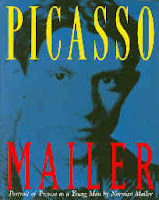So, before we begin, let me ask, which country published the book with the more disturbing cover?
The U.S.:

or the U.K.?

The U.K. cover is actually more true to the book, but enough about that....
There's an incredible feeling of accomplishment in finishing a book. I'm sure that this is a universal sentiment.
I mentioned in my post about the Mailer book that I had not completed anything recently. I finished that one last Tuesday. I just amazed myself by blowing through not one, but two more novels (albeit short ones) in four days.
The first one, for this post, is Piercing by Ryu Murakami, a Japanese writer unrelated to the more famous Haruki Murakami. Haruki is tops on my list of favorite writers. Ryu, not so much. Nonetheless, I still thought highly enough of him to pick up this latest novel without any planning or forethought.
I often will grab books at the library, keep them to read, and return them unmolested by my fickle, discriminating eyes. Sometimes I will even support the library by paying fines on books I ended up not reading. Such is the way of the BillyBrain.
And so it might have gone with
Piercing, but I was fresh off the
Mailer, basking in a post-biblio-coital aura, and I devoured it in one, two, two-and- a-half days. It was short (192 pages), disturbing, and absolutely riveting.


My history with the lesser of the Murakamis is interesting. I remember reading the unsettling debut novel
Almost Transparent Blue, which won Japan's prestigous
Akutagawa Prize in 1976. I can even place when I read the bulk of it: in New Orleans in June 2004. I was at a convention and read most of the novel while riding the stationary bicycle in the Hilton's gym. Shortly thereafter I read
In the Miso Soup, which was also very good. But shortly thereafter I embarked on his sophomore effort, 1980's
Coin Locker Babies. Somewhere in the middle I stopped reading it. I can't pinpoint why.

Let me lay it out on the line, Ryu (or Haruki too, for that matter) Murakami is not for everyone. He is less of a literary media darling than Haruki, as his books are more of the psychothriller genre. I'm generally not a big fan of psychothrillers, but Ryu is a cut above those with whom I am familiar.
His protagonists are damaged goods. They bear the psychological scars and baggage of being raised in late-20th century Japan. They come from broken homes and have impressive résumés of abuse and anger management issues.
These are bloody, disturbing books.
Like his previous works,
Piercing delves into the world of illicit sexual lifestyles, and not necessarily in a titillating fashion. There is no sexual intercourse between the covers of
Piercing, but human sexuality, and the unsettling variations on sex are core elements to the narrative.
Ultimately, this book is about violence. How sexual violence begets more violence. How abuse in childhood manifests itself in the lives of adults who bear the scars of that abuse.
The lives of the two main characters, Kawashima Masayuki, an ad-man in a seemingly vanilla marriage, and a young female S&M sex worker named Sanada Chiaki, intersect along the narrative arc.
The book opens with the Masayuki hovering over his new baby's crib, with his wife sleeping nearby. He is holding an ice pick and fighting his demons.
He concocts a plan to exorcise these demons, which brings Sanada Chiaki into his life.
We are not just told what is happening. We see inside the minds of these two disturbed products of a seemingly normal society.
Knowing what I have just related may be seriously off-putting to most. I did say that
Piercing is not for everyone. From the get-go, however, as I swallowed the tension of the potential harm to the baby in the opening pages, I was drawn in and riveted.
I was disturbed by this narrative, but in a much different way than Mailer's manifestation of the young Adolf Hitler. Yet, I shook off the chill that the final scene of
Piercing had sent down my spine, and I took a breath. I realized that Murakami had transported me to a dark, dark place. But now I was blinking in the sunlight, thankful for those things in life we may take for granted. This amazing writer's words tingled in my extremities, drawing me into a dark landscape, pinning me into a harrowing tale that pierced my imagination with tiny burning needles.
Some links:
A review in the Guardian
here.
A review in the L.A. Times
here. (Registration required)








































